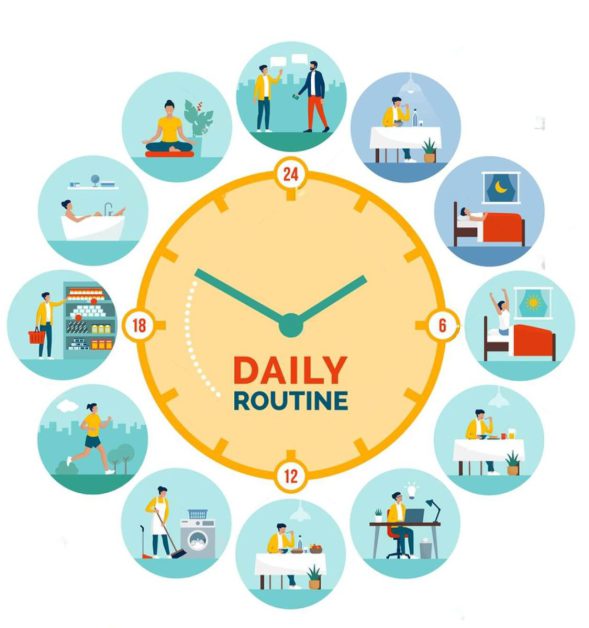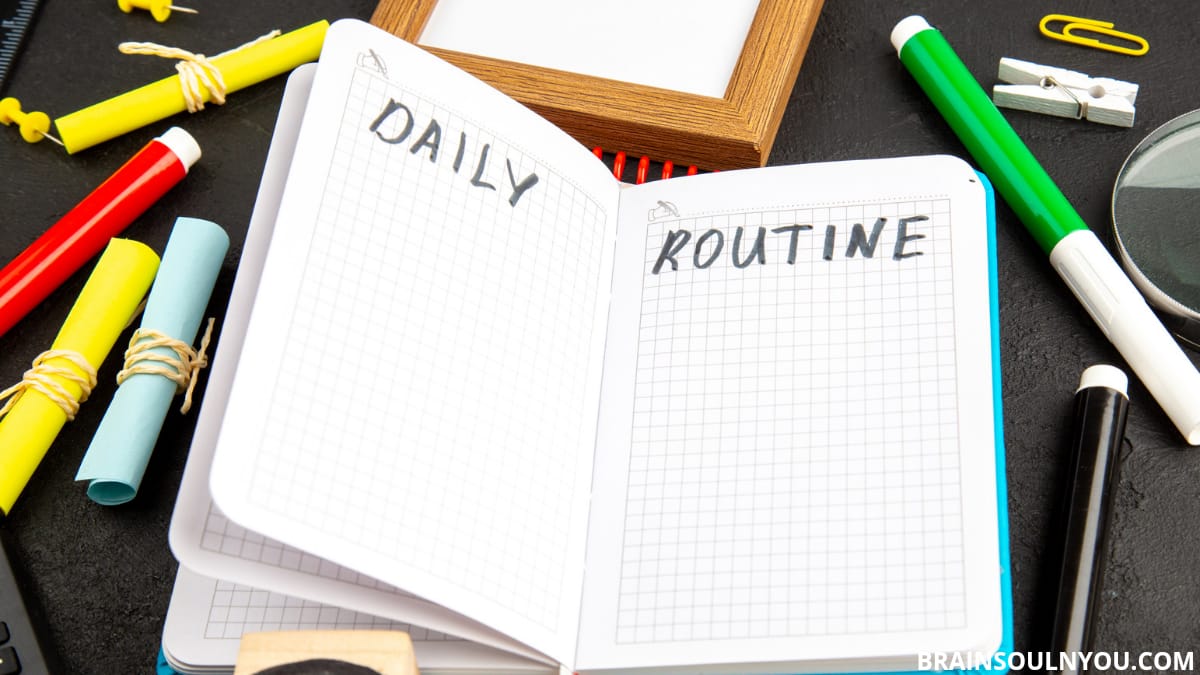Habits put your mind on autopilot, freeing up your concentration for bigger things. They are the rhythm of your daily lives, the background of everything you do. Going for a morning walk is a routine. It is also a routine to watch Netflix three hours before bed while eating popcorn.
The difference is that one of these daily routine examples helps you feel energized and productive, and the other depletes your energy.
So many people ask what should my daily routine is to lift me up instead of dragging me down?
A Daily Routine
A daily routine refers to a set of activities, habits, and tasks that you follow regularly. It provides structure and organization to your day, helping you manage your time effectively and accomplish your goals. Here’s an example of a daily routine:
Morning Routine
- Wake up at a consistent time.
- Engage in a mindfulness practice or meditation.
- Exercise or engage in physical activity.
- Eat a healthy breakfast.
- Review your goals or set intentions for the day.
Work/Study Time
- Start your work or study tasks based on your priorities.
- Stay focused and minimize distractions.
- Stay organized by using tools like to-do lists or calendars.
Midday Break
- Have a balanced and nutritious lunch.
- Take a short walk or engage in light physical activity.
- Use the break to relax and recharge your energy.

Afternoon Work/Study Time
- Resume work or study tasks, focusing on remaining priorities.
- Seek feedback or collaborate with colleagues or classmates, if applicable.
- Allocate time for creative or strategic thinking.
- Stay hydrated and have healthy snacks as needed.
Evening Routine
- Wrap up any remaining tasks for the day.
- Engage in activities that help you unwind, such as reading, hobbies, or spending time with loved ones.
- Have a balanced dinner.
- Practice relaxation techniques to prepare for a restful sleep.
- Review your achievements and plan for the next day.
Nighttime Routine
- Set a consistent bedtime to ensure sufficient sleep.
- It is recommended to disconnect from electronic devices for at least one hour before bedtime.
- Instead, engage in calming activities like reading a book or enjoying a warm bath to help relax your mind and prepare for a restful sleep.
- Practice a wind-down routine to signal to your body that it’s time to sleep.
It’s important to customize your daily routine to suit your lifestyle, priorities, and personal preferences. Experiment with different strategies and find a routine that helps you maximize productivity, maintain balance, and support your overall well-being.
Why Daily Routine is Important?
To give a direction to life, it is very important to have a daily routine. After knowing the benefits of daily routine, it will be easier to make them. There are multiple reasons why having a daily routine holds significance:
Structure and Organization: A routine provides structure to your day, helping you manage your time effectively and stay organized. It sets clear boundaries for when certain tasks should be completed, reducing procrastination and improving productivity.
Efficiency and Productivity: A well-planned routine helps optimize your time and energy. By prioritizing tasks and allocating specific time slots for different activities, you can focus on important work, complete tasks efficiently, and avoid feeling overwhelmed or scattered.
Goal Achievement: A daily routine helps you make progress toward your goals. By consistently allocating time for tasks that align with your objectives, you create a pathway for continuous growth and achievement. Regularly working on your goals in a structured manner increases the likelihood of success.
Stress Reduction: Knowing what to expect and having a sense of control over your day reduces stress levels. A routine minimizes decision-making fatigue by establishing a predetermined plan, freeing up mental space, and reducing anxiety about what needs to be done.

Health and Well-being: A daily routine can include activities that prioritize self-care, such as exercise, healthy eating, relaxation, and quality sleep. By incorporating these habits into your routine, you promote physical and mental well-being, leading to increased energy, improved focus, and better overall health.
Work-Life Balance: A well-balanced routine ensures that time is allocated not only for work or responsibilities but also for leisure, hobbies, and spending time with loved ones. This promotes a healthy work-life balance and mitigates the risk of burnout.
Consistency and Discipline: Following a routine promotes discipline and consistency in your actions. Consistently performing certain tasks or habits reinforces positive behaviors, making them more automatic over time. This discipline can translate into increased effectiveness and success in various areas of life.
Adaptability and Flexibility: While routines provide structure, they can also be adaptable to accommodate unexpected events or changing circumstances. Having a flexible routine allows you to adjust and prioritize accordingly, minimizing disruptions and maintaining a sense of control.
Overall, a daily routine provides a framework for a well-organized and fulfilling life. It supports productivity, goal achievement, health, and balance, while also reducing stress and increasing overall well-being.
Steps to Create an Effective Daily Routine
It can take up to 66 days to form any habit. If that sounds like a long time, think of it this way: It’s only 0.5% of the average lifespan of any person. Surely you can dedicate 0.5% of your life to creating a daily routine that leads to health, fulfillment, and success.
Creating a daily routine involves a personalized approach based on your lifestyle, goals, and preferences. Here are some steps to help you create an effective daily routine:
1. Identify Your Priorities
Determine your main priorities and goals in different areas of your life, such as work, health, relationships, personal growth, and leisure activities. This will guide your routine and ensure you allocate time to the things that matter most to you.
2. Set Clear Objectives
Establish clear objectives or tasks that you aim to accomplish each day. For larger goals, break them down into smaller, actionable steps to increase their attainability and make progress more manageable.
3. Evaluate Your Current Schedule
Assess how you currently spend your time. Identify any time-wasting activities or habits that are not aligned with your priorities. This will help you identify areas for improvement and make room for more important tasks.
4. Plan Your Ideal Day
Imagine what your ideal day would look like, considering your priorities and goals. Visualize how you would allocate your time throughout the day, including work/study time, breaks, self-care activities, exercise, and leisure activities.
5. Create a Structured Routine
Based on your objectives and ideal day, design a structured routine that includes specific time slots for different activities. Set consistent wake-up and bedtime to regulate your sleep schedule.
6. Prioritize Important Tasks
Identify the most important tasks or activities that align with your priorities and allocate dedicated time for them during your peak productivity hours. This ensures that crucial tasks receive focused attention.
7. Include Self-Care Activities
Prioritize self-care activities, such as exercise, meditation, relaxation, or hobbies, to promote your well-being and avoid burnout. Allocate specific time for these activities within your routine.
8. Be Realistic and Flexible
Be realistic about the time required for each task and allow for flexibility in your routine to accommodate unexpected events or changes. Avoid overloading your schedule, leaving room for breaks and relaxation.
9. Test and Refine
Implement your new routine and evaluate how it works for you. Pay attention to your energy levels, productivity, and overall well-being. Adjust and refine your routine as needed to find the optimal balance that suits your needs.
10. Maintain Consistency
Consistency is key to establishing a routine. Stick to your schedule as much as possible, even on weekends or days off, to reinforce positive habits and maintain momentum.
The Important Task to Do in Daily Routine
Make time for Work out
Exercising is another essential daily routine example. This gives you the biggest morning benefits: The endorphins released during exercise will give you more energy for the day and boost your mental sharpness. But when you exercise, you will get benefits like better health, increased confidence, and mental clarity. Whether you like it or not, you should get out there and do it. Once you make it a part of your routine—and see how good it makes you feel—you’ll never want to stop.
Meditation
Taking quiet time clears your mind and focuses your attention. Therefore, although you can meditate at any time of the day, it is usually part of your daily morning routine. Spends 10 minutes each morning on a priming exercise, a form of “active focus” where you practices gratitude and articulates your intentions for the day. You can also use guided meditations, mantras, or any ritual that will take you through the day.

Write Journals
Creating a daily routine for the evening is as important as creating a morning ritual. Keeping a journal is a habit that works equally well in the morning or in the evening. What’s the best thing to write? You can write two things: gratitude journals and goal-setting journals.
In your gratitude journal, write down at least three things that you are grateful for at that time. In your goal-setting journal, record the three ways you work toward your goal, as well as your intentions for the day. You will hold yourself accountable and ensure that you stay connected with your goals at all times.
Healthy Breakfast
Having a good breakfast is the most essential daily morning routine. Don’t wait until late in the day to nourish your body – you need that energy right now. The morning meal is the most important. This gives you the energy to make the whole day productive. That’s why it is very important to have healthy food in the morning. Such as fruits, protein diet, green vegetables, sprouts, nuts, etc.
Learning
Give time to learning. Read books and articles. Listen to a podcast. Read a biography of someone you admire. Find inspirational quotes online. Feed your mind with positivity, and you will elevate your life accordingly.
The only difference between a successful person and an average person is discipline. Discipline comes by following a certain healthy daily routine. If you want to be successful in your life make your daily routine and be disciplined.
Reals, also How to Stop Making Excuses, 5 Tips to Get Out of Your Comfort Zone, Master your Mind, Kaizen Technique: Change for the Better, IKIGAI – A Reason to Jump Out of Bed Each Morning
Love,
Saurabh Goel
Saurabh Goel
He is the Founder and CEO of the Training and Counselling Company ‘Brain Soul & You’. He is an NLP Wellness Coach, Life Coach, Brain analyst, and Trainer for Education, Corporate, and Entrepreneurship. For more than 7 years, he delivered presentations on entrepreneurship, mind programming, and motivation. He did his B.tech in IT and later choose to be a successful psychologist. He is helping people in various ways through his counseling and training sessions.


